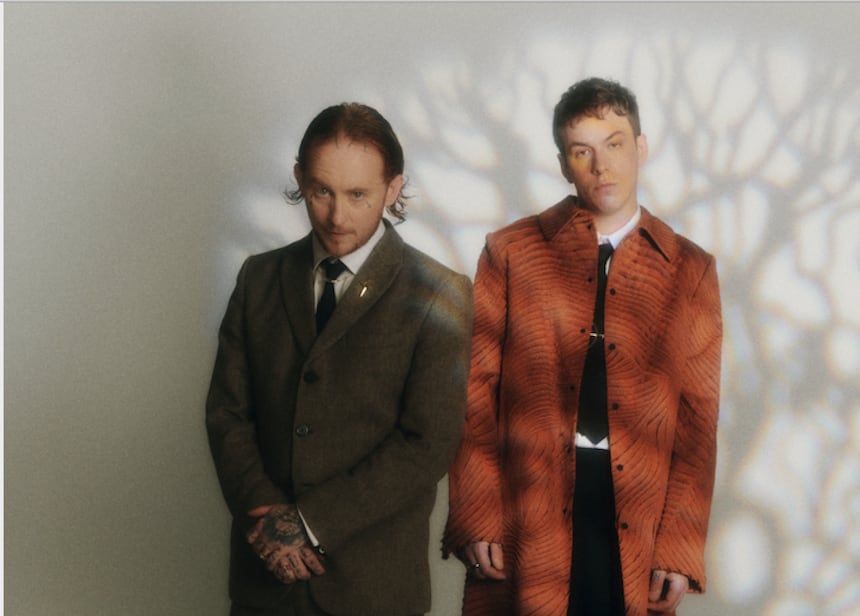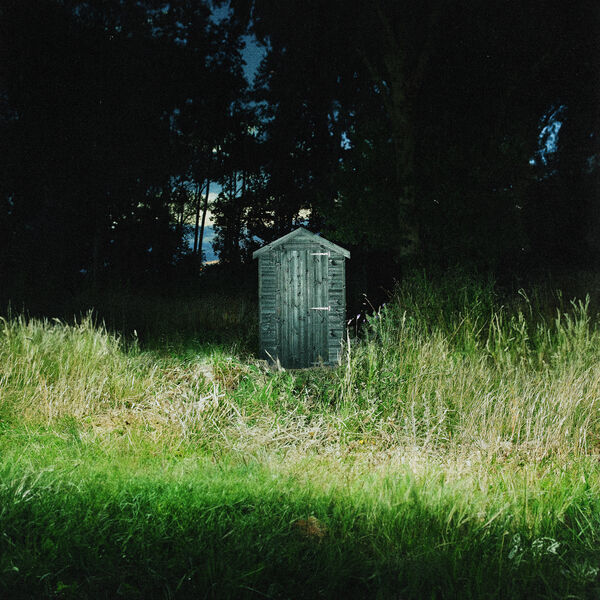Your new album is very cinematic. Would you say that’s its core strength?
Frank: Wow. I think that, yeah, in that regard the main strength is the atmosphere. You know, when you talk about ‘cinematic’, that aspect can only develop from the atmosphere created by the album. We were just talking about how much work went into the sound and how much time we had. Dean was talking about how there were moments when they found the right tone and the right pedal setup, and then they started running vocals and drums through it just to see. And that essentially created an atmosphere that defines the album.
Dean: It’s not necessarily a performance from an instrument. We did a lot of what you might call traditional sound design, where you’re making sounds you could never recreate and I think that added to the atmosphere. But the goal was to create an atmosphere that felt befitting of the music we’d made.
Frank: It’s so funny because we talked about making a cinematic atmosphere. A lot of my points of reference were like No Country for Old Men and other films. I would always come back to film and I’m really glad to have a partner like Dean ‘cause he understands how my mind works. I remember when we were working on Modern Ruin (2017), I was discussing with Catherine Marks, the mixing engineer, about the sound feeling like late midnight, and Dean immediately understood and said, ‘I got it.’
What message did you want to communicate through the music, themes and lyrics of this album?
Frank: I can’t give you the answers. (laughs) That takes too much away from other people. An interesting point: someone asked me what it means - what ‘Dark Rainbow’ means - and I asked him, “What does it mean to you?”. He said, “The tension between happiness and sadness,” and I was like, “Well done,” because that is something I could not put into words clearly and I’ve been talking my way around it for months now. What we wanted to convey was the comfort and acceptance found in the later stages of a grieving process. There’s solace that comes from that. It might not be what you wanted but it’s a kind of peace and, ultimately, it ends up as deep peace; the kind of peace you get when you’re ready to start living again. That’s what I was trying to convey I think.
Dean: This is the first record where I’ve listened consciously to what lyrics are being brought into the room during the process. We do this sort of independent thing where Frank writes lyrics and I write music: we write songs together. So essentially what Frank does when he first hears the music is work out if there’s lyrics that fit. But we never force it and there can be times where he’ll have a folder of lyrics and I’ll have a folder of music. We move on from loads of them because they don’t merge. What happened this time was we knew what we were making and then we were like “Let’s make more that fits this world”, and I think that’s when more music came. It wasn’t a fully conscious decision like, ‘I’m going to write a song about this.’ But during the last month of writing, the concept of the rainbow became clear, albeit in an abstract way.
Frank: It’s more of a feeling.
Dean: A mood and a feeling… I was then able to create more music that fit into that world and that was appropriate and effective.
Frank: You mentioned that each new song fit into that world, yet each one came from a perspective we hadn’t explored before. We were in the same landscape and it was a beautiful moment of alignment that I’m not sure we’ve ever had that late in the process and that changed everything because then we were really right in the album together. It was the first time we were doing it in tandem. I was going away and I was rewriting songs overnight, pulling parts out, digging deeper into lyrics than I’ve ever gone before to find a sentence that I knew existed but I couldn’t remember.
Dean: And there was some music I wouldn’t be able to leave. I would keep saying, “I think there’s something in it for you”. It was different this time. But with a lot of this stuff knowing exactly what’s happening in those moments is quite hard and it’s more an attempt to know what’s happening.

The title ‘Dark Rainbow’ presents a striking contrast. How do you interpret this juxtaposition, especially considering it’s also the name of the album’s final track?
Frank: Well it’s never a summing-up. It could be a starting point. You need light to have a rainbow, ultimately, but you also need a storm. It doesn’t happen without rain. And actually what you see as a rainbow is what happens when those two forces meet and pass through each other. To me, the record is very much about the process. It’s about the work that’s done when good and bad meet and what can be born from it. That is what a dark rainbow is: the tumultuousness of growth, the transition. I know there’s a mystery around it all and what I was trying to say in that song was different to what I was trying to say in the album but both parts matter to me. I don’t know how to sing it live. I haven’t gotten all the way through yet without crying. The album is different for me. It’s interesting because I wrote the last lyrics on the record years ago and they didn’t find their place anywhere in our music until now. There’s a real beauty in there that they’ve been there all along and they finally found their place on this, over some devastatingly bleak soundscape of music. That’s why you cannot call this a summing-up. There’s a metamorphosis happening in the last 45 seconds of this record and that is what I’m excited about. That’s the starting point for me.
What is your approach to studio work in an era where technology is so pervasive?
Dean: I think that there is a danger of everything being too accessible to create music. It’s an old thing that creativity needs limits. I find that’s a constant challenge for me when I’m slightly uninspired by something and you can just load up any instrument on your laptop for free now. There are moments where that’s led to songs for us but there are moments where that can be overwhelming and it’s just choice fatigue. You can press a button and hear it again so I have to fight against that and slightly create some false restrictions. There’s always this almost Pandora’s box that you can open.
Frank: It’s so interesting to hear you talk about that because to me I cannot use it. To me, it’s just a piece of metal. It’s not a Pandora’s box I see, it’s much more rudimentary.
Dean: And the suggestion is you get into the world of digital simulation and there’s every knob on it. Then it’s like “You wanna go to the 80s version? The 90s?” It’s gone insane! Now you have digital guitar amps. So I have to fight against it because I think it was simply a toolbox but Pandora’s box feels like that in your head. The idea is maybe the same but it needs to be pushed against a little bit.
Frank: I will never take that route in my writing; I simply refuse. Interestingly, I used an iPad for drawing, and I worked with Procreate. For a year I used it and I had every brush at my fingertips and couldn’t make my way around it, and I didn’t because there was too much there. I would sit down to meditate and draw and I was overwhelmed. But also, it’s like walking to the shops to buy it, where you might get hit by a bus or struck by lightning - that’s where real inspiration happens.
How would you define the punk rock of today?
Frank: I would try not to. I think it’s thriving and healthy. It’s not a coincidence - the world is fucked up.
Dean: Sadly. Do we want punk rock to be thriving, considering all the social and political issues? At least we have it as a reaction. Maybe that’s why it’s thriving; because of what we’ve been going through.
Frank: I think it’s because of what we’ve been going through previously to this moment in time, like the pandemic, the isolation, the oppressive system coming down from the top. More powerful and more blatant. It did not give a fuck and the majority of the people in Britain have been hit by disorder. Like really hard.
Dean: It’s an extreme time to be alive. So punk rock is always there when that happens.
Frank: It’s there when needed and that’s the fucked-up thing. If punk rock is thriving it’s because we’re dealing with a lot of things. And it’s good to have that as a mediator and punk rock is a mediator. It’s fucking scary.




